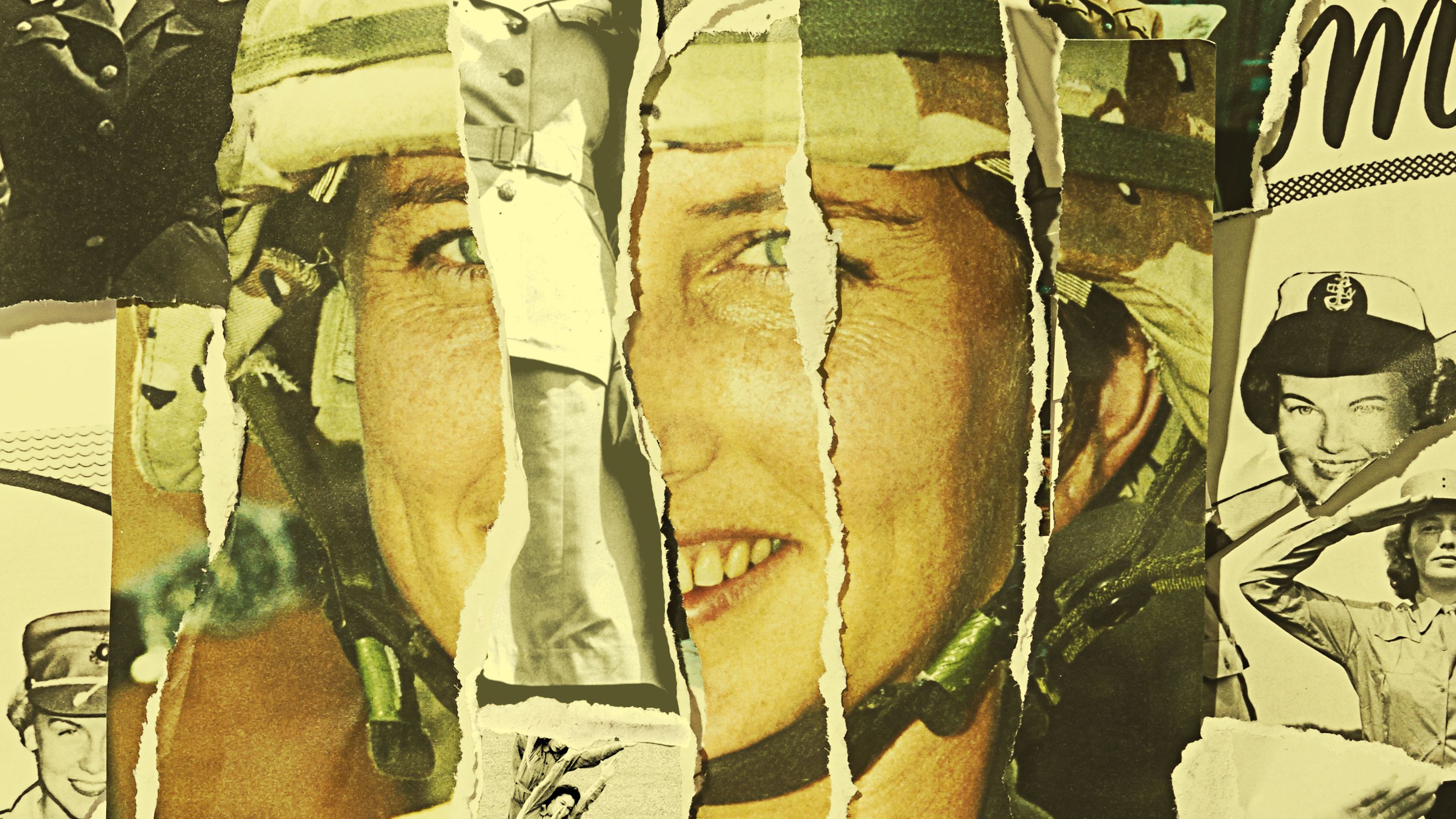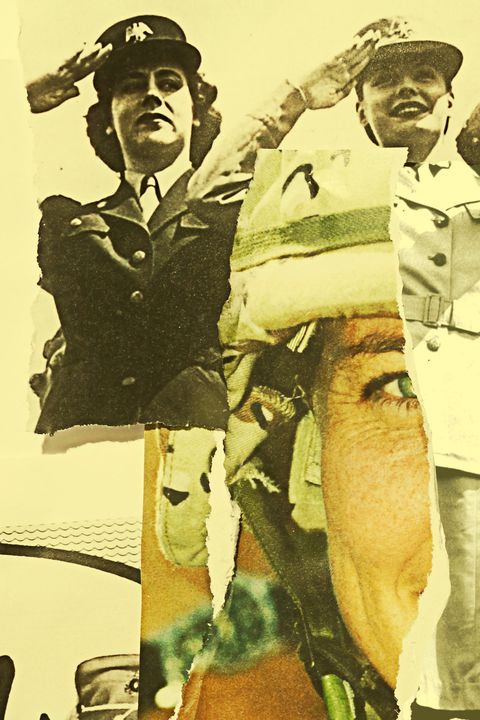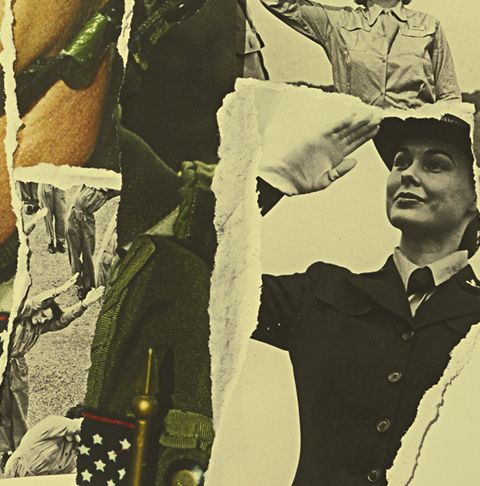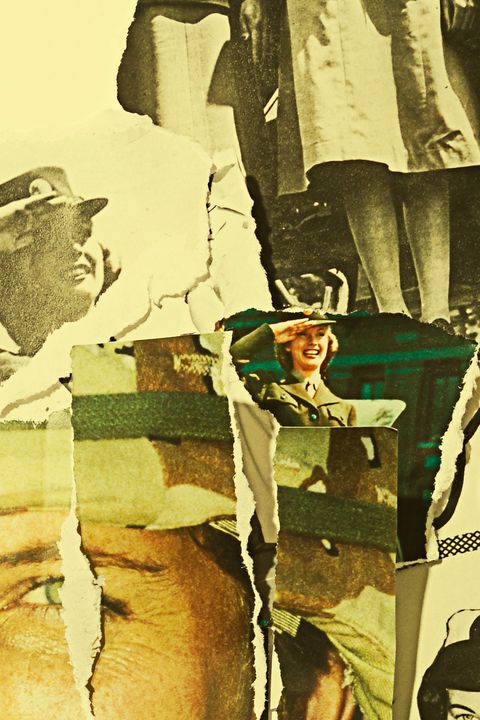When Female Veterans Return Home
More than 380,000 women have served in Iraq and Afghanistan, and about 1 in 5 of them return with post-traumatic stress disorder. One unorthodox veterans’ retreat is teaching female soldiers that war has not broken them. In fact, their anguish may be key to their transformation.

First Lieutenant Brie Zeiger tried to stifle her fear as the C-130 transport plane she was riding in began its descent toward Forward Operating Base Salerno in a hostile region of Afghanistan. The base was attacked so often that the soldiers nicknamed it “Rocket City.” Just three months earlier, in June 2012, insurgents had detonated a truck bomb and invaded the base, killing two Americans. As the plane approached the runway, Zeiger heard an odd sound, like pellets smacking a metal target at a fairground shooting game. This was normal, the crew told her, just incoming fire from the Taliban.
Zeiger, then 26, was a nurse in a small surgical unit there. At night, the faintest whir of helicopter blades would jolt her from bed; wounded were on the way. She loved the challenge of the work, the rush of making life-or-death decisions. “I felt like I was doing exactly what I was meant to do,” she says. But in time, she was numbed by the relentless stream of injured soldiers. One soldier arrived riddled with shrapnel from an improvised explosive device. The medical team tried to keep him alive by pumping air in and out of his lungs. Zeiger remembers looking into his eyes, digging through his bloody clothes to find his dog tags, then watching the 23-year-old pass away. “There is something about seeing a soldier die that changes you,” she says.
Her nine-month deployment was so profound and complex that when she returned home, she struggled to talk about it. “How do you explain that your normal day is seeing limbs blown off, the way it looks and smells?” she says. “How do I explain how that changed me for the rest of my life?” The few times she tried to talk with her father about the war, they argued. She grew resentful. Civilians could never understand what she’d experienced, she thought, so she kept quiet.

Zeiger’s sleep diminished to a few hours a night. She felt detached. Rage would pour out of her unexpectedly. “I couldn’t feel anything except for negative emotions,” she says. She went to counseling and was diagnosed with post-traumatic stress disorder (PTSD). “Who doesn’t have that?” she quips. The Army’s therapists never helped her move forward, she says; they just identified her problems and urged her to get back to work. As she rose through the ranks to become a company commander, she stopped interacting with patients, leaving her more isolated. “I felt broken,” she says. “I thought about killing myself. I had so much guilt—survivor’s guilt—there was no way I could continue living like this.”
A friend convinced Zeiger to try a radically different program designed to help soldiers like her. And so, one morning in August 2017, Zeiger, then 30, got into her Audi A3 and began the six-hour drive from her home in North Carolina to Boulder Crest Retreat, outside of Washington, D.C. There she would spend the week with six other women who had served in war zones. They too struggled with isolation, insomnia, depression, anxiety, PTSD, and thoughts of suicide. She’d heard Boulder Crest was unlike any treatment program in the country. Rather than desensitize soldiers to bad experiences, Boulder Crest helps them grow from their trauma—showing them how their worst experiences can become a catalyst for turning their lives around. And unlike many other privately run veterans’ retreats, which cater only to men, Boulder Crest has a program for women.
Still, as Zeiger traveled north, she began to get cold feet. Maybe I should call and tell them I am sick or that work called, she thought. She’d tried army counseling three separate times, and nothing had changed. Would this place really be different?
Zeiger is one of more than 380,000 American women who have served in Iraq and Afghanistan. Though most have not officially been in combat roles, these women have taken on crucial responsibilities in very dangerous places, sometimes fighting alongside the men; 168 have died in these wars.
Get exclusive access to fashion and beauty trends, hot-off-the-press celebrity news, and more.
Since all combat jobs opened to women in January 2016, those numbers will likely grow. By 2020, the U.S. Department of Veterans Affairs (VA) estimates there will be nearly two million female veterans. And many of them will contend with the kinds of problems that have plagued Zeiger. According to a 2013 study from researchers at the National Center for PTSD in Boston, 21 percent of women and 23 percent of men deployed to Iraq and Afghanistan were likely to report symptoms of probable PTSD. Though those rates are similar, more women report depression, in part because they are more likely to experience it as a symptom of PTSD than men.
While civilian and military men commit suicide at higher rates than their female counterparts, according to a 2016 VA report, in 2014, the difference between soldiers and civilians was greater for women in all age groups. For young women it is particularly alarming: In 2014, female veterans between 18 and 29 years old killed themselves at six times the rate of civilian women of the same age. Researchers don’t know exactly why so many female veterans are committing suicide, but they have found that survivors of military sexual trauma have a higher rate of suicide than others, and about 20 percent of female soldiers have been victims of such abuse, according to the VA. The study also found that female veterans were more likely than civilian women to kill themselves using a firearm—the most lethal method of suicide.
Navy Captain Michael Colston, a psychiatrist and director of mental-health programs for the Office of the Assistant Secretary of Defense for Health Affairs, says the military has been focused on PTSD, spending more than $330 million on the disorder over the last decade. Treatments such as prolonged-exposure therapy, in which patients repeatedly recount their traumatic experiences to desensitize them, and cognitive-processing therapy, in which the trauma is also revisited, are the norm, as is prescribing medication, including the antidepressants Prozac, Paxil, and Zoloft. Most therapy lasts two or three months, with follow-up over six to 12 months for medication management, he says.

While these therapies have decades of studies to validate them, many soldiers fail to complete them because of the effort they require and the need to revisit the trauma, Colston acknowledges. “It can be unsettling for some,” he says. Up to 80 percent of veterans drop out of these therapies at VA centers, according to a 2015 study led by a researcher at the Veterans Affairs Boston Healthcare System. Those who complete treatment do benefit, but not always enough. One review of decades of studies by VA researchers shows that while the therapies reduce PTSD symptoms, more than 70 percent of patients still meet the criteria for PTSD when the therapy ends. Shira Maguen, a psychologist with the San Francisco Veterans Administration Medical Center and a professor at UCSF Medical School who works with and studies female veterans, says that some VA centers have begun offering a few complementary and integrative treatments for PTSD in addition to the evidence-based psychotherapies. “We know that we need a multipronged approach,” says Maguen. “Veterans need alternatives.”
The Boulder Crest Retreat has been effective for those who have not been helped by traditional treatment. Unlike most programs, which aim only to manage PTSD symptoms, Boulder Crest acknowledges that trauma fundamentally changes individuals; there is no returning to normal. Their methods are based on the idea that trauma is deeply painful, but that pain can force dramatic, beneficial transformations.
That is not wishful thinking; it’s a phenomenon called post-traumatic growth. Most trauma survivors struggle with post-traumatic stress symptoms in the wake of horrific events, but about two thirds of them also report their lives are better, which researchers have determined is post-traumatic growth. That idea challenges psychology’s long-held assumption that people react only negatively to trauma. But few, if any, veterans’ programs embrace it. That is what Boulder Crest is trying to change. (Colston says he likes the concept of post-traumatic growth therapy but the military uses therapies that have decades of studies to back them up.)
How do you explain that your normal day is seeing limbs blown off?
On the first day at Boulder Crest, Zeiger and the six other veterans sat around a table on a stone patio overlooking a small pond, along with Suzi Landolphi, Boulder Crest’s only licensed therapist there, who jokes, cajoles, and makes pointed insights about the women’s deeply personal challenges. Zeiger, who is tall and athletic, with rigid military posture, watched the other women from behind her Wayfarer-style sunglasses until Landolphi pulled her up from her seat. Landolphi explained that Zeiger, who said she felt out of shape, was going to hold Landolphi up using just her arms. Zeiger looked skeptical. Landolphi asked her to lie down on the patio with her arms raised upward. They placed their hands on the other’s shoulders. Then Landolphi swung her legs up in the air and did a handstand on Zeiger’s shoulders. Their bodies formed a giant L. “You are much stronger than you think,” Landolphi told her when they finished. “You have to be more open about the greatness of you.”
That is what Boulder Crest tries to do psychologically for these women—to reveal they have been taught by psychologists, the military, and society to view themselves as broken because of their mental-health struggles. Boulder Crest wants to help these women see that they are not broken—that, in fact, their struggle makes them strong.
Boulder Crest Retreat was founded by Ken Falke in 2013. The now-56-year-old retired Navy explosive-ordnance-disposal technician served in the Bosnian War and later founded a military contracting firm. When wounded soldiers began coming back from Iraq and Afghanistan, he visited them at Walter Reed National Military Medical Center and hosted them and their families at his rural Virginia home. He donated 37 acres of his property and worked with innovative psychologists to develop the Boulder Crest Retreat. Falke opened a second location in Sonoita, Arizona, in May 2017. It costs $8,333 for each veteran to attend, but the nonprofit does not charge for the program.
In his search for effective treatments, Falke met Richard Tedeschi, professor emeritus in the Department of Psychological Science at the University of North Carolina at Charlotte, who pioneered the study of post-traumatic growth. Back in the 1980s, Tedeschi and his research partner, Lawrence Calhoun, began speaking to older women, mostly widows. The women told the researchers that while they missed their husbands dearly, they had also developed new friendships, formed closer relationships with their children, and gained a newfound independence. Tedeschi and Calhoun also discovered a study of Vietnam prisoners of war that found that soldiers held captive, sometimes for years in horrific conditions, felt their lives were better as a result, echoing what the researchers were hearing from their own patients. Trauma was hard, sometimes debilitating, but it also led to real change. They coined the term post-traumatic growth and developed a scale to measure positive change.
Hundreds of studies followed, showing a majority of trauma survivors’ suffering is real, and yet they report changes in one or more of five areas: They feel psychologically stronger, are open to new possibilities, and have deeper relationships, an enhanced appreciation for life, and an increased sense of spirituality. With the right kind of support, survivors can see their lives have more meaning than before.
At Boulder Crest, the women began their days at 6:30 a.m. by writing in their journals, followed by exercise and then long guided sessions—sometimes as a group and sometimes individually—delving into their strengths, struggles, principles, and goals. These emotionally draining discussions were followed by activities like archery or kayaking, where the day’s lessons were reinforced. They also learn Transcendental Meditation and meditate twice a day. They eat meals together. Each day ends at 8:00 p.m. with a guided discussion around a fire. The staff teach the women how to regulate their emotions and improve their relationships, careers, and physical fitness.
More than 260 soldiers have completed the program, including 67 women. An ongoing assessment found that after 18 months, Boulder Crest participants’ post-traumatic stress levels fell by 56 percent. Anxiety was cut by 45 percent and depression by 50 percent. Post-traumatic growth scores, which measure positive change, were up 40 percent.
Two days into the weeklong program, inside a large log-cabin-style building, Zeiger and the others listened as Meredith Mathis, one of the guides, spoke about her time in Afghanistan. A superior officer abused her emotionally and then sexually assaulted her for several months. “I hoped I would get blown up every time I got in my MRAP [mine-resistant ambush-protected vehicle],” Mathis told them. After she returned from another deployment as a member of the Cultural Support Team program—an elite group of women who accompanied special-operations forces to gather intelligence from Afghan women—Mathis started experiencing severe, constant vertigo, depression, and anxiety, and she was put on antidepressants and antianxiety medication.
Three years later, Mathis came to Boulder Crest. “For a long time, I didn’t trust anyone,” says Mathis, now 33. “You can’t be vulnerable in the Army without someone taking advantage of it.” There, she found a safe community of women to whom she could finally open up. Now she no longer needs medication; she started her own photo-restoration business and published a book about her struggles before working part-time at Boulder Crest to help other women like her.
Mathis is no psychologist. Her only qualifications are her experience and training here. Other than Landolphi and one more licensed therapist at its Arizona location, Boulder Crest does away with the professionals, preferring instead to use guides—veterans and civilians whose stories of suffering and transformation help participants see that they too can grow. A 2004 study conducted by Tzipi Weiss, an associate professor of social work at Long Island University, found that just having contact with someone who has benefitted after trauma can increase the likelihood of post-traumatic growth.
You are much stronger than you think. You have to be more open about the greatness of you.
In the spring of 2016, a soldier we’ll call Sophie, who asked we use a pseudonym to protect her identity because she’s still in the military, went through the Boulder Crest program with Mathis. She had spent 15 months doing construction work in Iraq and then joined the Cultural Support Team program. Shortly after arriving in Afghanistan, a soldier was killed. “It was a heartbreaking reminder of how dangerous our job was,” she says.
Then in October 2011, a friend, Ashley White, a highly decorated soldier who was profiled in the 2015 best-selling book Ashley’s War, was killed in Afghanistan when she walked into a compound rigged with improvised explosives. Sophie couldn’t attend White’s funeral because she was deployed, so she ignored her feelings.
Isolation was normal for Sophie. In Iraq, fewer than 10 women were in her company of 120, mostly enlisted soldiers who, as an officer, she was prohibited from socializing with. “I just buried my emotions most of the time,” she says. She dwelled on split-second decisions she made, like not returning fire into a village when she could not see the shooter. Should she have defended herself even if she risked shooting civilians? Did she let her fellow soldiers down?
When Sophie returned home, she got married and left active duty. She had trouble sleeping, and when she did, nightmares about walking through an Afghan village without her weapon or her team plagued her. She felt anxious, alone, and adrift. “When you are doing something significant and worthwhile, it is exciting, like a drug,” she says. “It was hard to come back home.”
Studies show that absence of support makes PTSD more likely, and Maguen’s research on veterans of the first Gulf war shows strong social support predicts post-traumatic growth. Female soldiers are more likely than men to experience isolation, as women make up only 16 percent of the armed forces. One Boulder Crest participant noted she was the only woman among 1,700 men.
Many women in the military avoid fraternizing with men because they worry others will think they are sexually involved. (Zeiger says in the military, women are considered either “sluts or lesbians.”) Female soldiers often struggle to find anyone they trust, and that isolation can prime them for PTSD, Maguen says. The military’s high rates of sexual assault and harassment can further alienate women, she adds, making them more vulnerable to mental-health problems. Given the importance of social support, Boulder Crest works hard to create a supportive and long-lasting community for the women who come here.
On the second full day at Boulder Crest, Zeiger stood in front of the group and spoke about her family. “My father was a very depressed and angry person,” she explains. She felt her mother was controlling and judgmental. But, Zeiger says, she also acquired good traits from them: faith, a sense of humor, and an interest in sports.
Hanging behind Zeiger was a family tree of sorts. She wrote down the traumas her family members had experienced and their destructive behavior in red. Then, in blue, she noted positive behavior. It is important to understand both, says Landolphi, so the women don’t feel victimized. If the veterans can see their family as complex and flawed, they can better understand their relatives’ actions and how those events affected them. And that knowledge can lead to change. Then Zeiger told the group something she had told few others: When she was 10, she was molested by a family friend. After joining the Army, she was sexually assaulted by a fellow soldier.
Opening up was cathartic. “I never realized I became the person I am because of how I was raised,” she says. “It was powerful for me to understand I have the choice to change.”
Boulder Crest delves into family because childhood trauma is surprisingly common among soldiers. A 2014 study coauthored by several VA researchers found 28 percent of women in the military reported four or more traumatic childhood experiences, compared to 20 percent of women with no military service. Another study found that half of women in the military reported childhood sexual abuse. Childhood trauma likely pushes young adults to join the military in search of a new family, stability, and purpose, says Landolphi. But those in the military with troubled childhoods are more susceptible to mental-health problems. A 2012 study led by a researcher at the Army Institute of Public Health found that 65 percent of soldiers who attempted suicide had also experienced childhood trauma.

Opening up not only helps the women learn about themselves, it gives others an opportunity to show they care. “When others start helping you, it becomes obvious there is something you can do for people too,” says Tedeschi. That desire to help others is considered growth.
On the fourth day, as a hard rain fell, the women visited a horse farm. There, a veterinarian led four horses into the indoor ring. Landolphi told the women to pick the horse that most resembled them. One of the women, 35-year-old Sergeant First Class Celeste Holley, stood rigidly behind the others. “Can I opt out?” she asked. She fell off a horse as a child and is terrified of them. Landolphi told her no. She was here with her team; she needed to try.
Zeiger liked horses, so she walked with Holley as she approached them, helping her get closer and even touch one. Holley chose a dark-brown horse that had been abused when it was young. Holley, too, had suffered childhood abuse.
That night around the bonfire, a guide asked the women to share their win for the day. Holley spoke up. “You were patient and allowed me to be vulnerable, and it felt really good,” she says. “I’ll be leaving here knowing that I can call on you all and you will support me.” Feeling good at Boulder Crest, far from the complications of daily life, is easy. Some of these women have been to other retreats and failed to change when they returned home. Boulder Crest combats that fall-off effect by continuing the program for another 18 months remotely. The women are bound together as a support group, participating in facilitated regular team video calls with a guide.
Eighteen months after her program ended, Sophie remains in touch with group members. “Talking to women who had similar experiences helped me get through the things that I could not let go of from the deployment,” she says. “I don’t think it could have happened any other way.”
Sophie ended her marriage—she was finally able to accept that the relationship was not good for her—and is sleeping well for the first time in years. She is more open about her struggles and, as a member of the reserves, is looking for ways to mentor young female soldiers. “I used to get my self-worth from success in my career,” she says. “Now I get my self-worth from being a good family member and friend.”
Zeiger’s group became so close that they set up a group text and chat many times a day. It’s a safe haven where the women can vent, ask questions, get support when they fail, and share successes. “We rely on each other,” Zeiger says. “It has been nice to play on our strengths, to help each other.”
In the 15 months since Zeiger left Boulder Crest, she has noticed changes large and small. “I don’t fly off the handle as much,” she says. “I am able to work through what I am feeling and then have a conversation about it.” She has left active duty and is now in the reserves, has gotten married (two women from Boulder Crest attended the wedding), and has moved into a new home in Knoxville, Tennessee. Through all of the changes, she has kept up regular contact with women from her retreat group. “I am more in touch with how I feel after Boulder Crest,” she says. For the first time she can remember, she even feels happy. “I got my life back, actually a better version of me.”
This article appears in the November 2018 issue of Marie Claire.